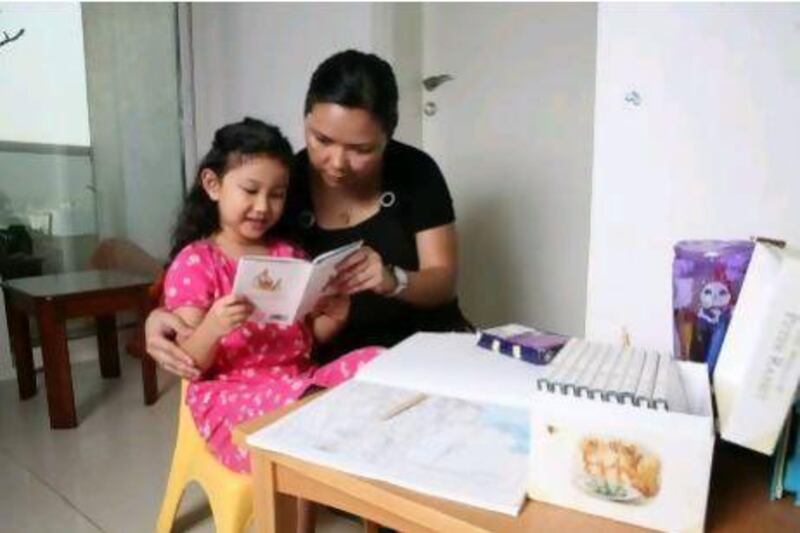The highest amount of "Likes" I've ever received from a Facebook posting have been in response to comments made by my four-year-old. The first was when she asked if the delivery guy was a man or a woman - while he was unloading in front of us. The second was her announcement that she was going to give up hitting her little brother for Lent. As a parent, it's tempting to post every humorous comment your child makes online, but lately I've tried to restrain myself because I'm concerned about where this information will end up. I fear her computer-savvy classmates of the future could access these remarks and use them to make fun of her, creating misery at school and animosity at home.
I'm not the only mother sharing information about my child far and wide. As you read this, parents across the globe are creating online footprints for their offspring. A quarter of children have had their pre-birth scans uploaded to the internet by their parents, according to a study by AVG Technologies - that's foetuses with an online presence. And a third of children have had images of them posted on the internet from birth. Whether it's a blog about a child going through the terrible twos or a YouTube video of a first ballet lesson, the web is flooded with information about small children, provided by parents. Much has been publicised about how important it is for parents to monitor their children's use of technology, but few guidelines have been given for parents of young children. When children aren't old enough to read, write or press "upload", is it appropriate for parents to do it on their behalf?
Grace Fujimaki, a marketing specialist living in Dubai, frequently talks about her children Pristine, eight, and Benjamin, five months, in her blog www.sandierpastures.com. "My blog was initially created to update friends and families back home so it was natural to include topics about my daughter and now I am including topics about my son as well," says Fujimaki. For her, blogging about her children has been a positive experience. Over the past five years, readers have watched Pristine grow up and congratulated her on her achievements and offered parenting advice to Grace. "I let Pristine look at the readers' comments so she's motivated to do better when they praise her," says Fujimaki. "She loves being in the blog and when she does something right, she'll ask: 'Will you blog about this mum?' and 'Will you tweet that?' She is very aware of social media."
Putting information about your children online, it could be argued, is simply a progression of something parents have always done. In the past, people carried photos of their children in their wallets and mailed out family newsletters. Today, this form of sharing has simply gone digital. Indeed, baby books may soon be assigned to history with the rise of social media sites designed to chart your child's development in more detail than ever possible before. "An older child looking at digital baby mementoes with a parent will find it a bonding experience, something that promotes a sense of belonging and emotional attachment," says Dr Amy Bailey, a clinical psychologist at kidsFIRST Medical Center, Dubai (www.parentingdubai.com).
Despite all the plus points, many experts and bloggers agree that a degree of self-regulation is essential. "A child should never face a situation where they feel ashamed of what their parents put online as they move through high school, university or even into their future professional lives - if parents are mindful from the onset that these uncomfortable situations can be minimised," says Naeema Jiwani, a child development psychologist at the Human Relations Institute, Dubai (www.hridubai.com). Indeed, some bloggers have considered the consequences early on. Alison Perry of www.notanothermummyblog.wordpress.com says, "When I was pregnant, I made a decision to not post photos of my daughter on Twitter, on my blog, on Instagram or on Flickr. I only post photos of her on my Facebook account, which is private."
Whether Facebook is truly private is up for debate, but there are other ways to ensure your information is secure. Websites such as Wee Web (www.wee-web.com) is a family networking site designed as a safe place for parents to build their kids' digital footprint. On the site, you can share photos and stories, confident in the knowledge that you retain control over who sees it.
Many bloggers are torn between a desire for privacy and a desire to share. "I would feel uncomfortable posting things like my son's exact birth date, the name of his future school and what classes we participate in. And in this day and age of cyber stalkers and identity theft, the need to protect one's information is even more vital," says Sandy Bremner, a mother who is based in Dubai and blogs at www.gingerandscotch.com. But how real is this threat?
Nancy McBride, the national safety director for the National Center for Missing & Exploited Children in the US, believes posting kids' photos online does pose a potential risk and advises parents to make sure only people they trust have access to their photos. She does, however, say parents shouldn't be unduly alarmed. Pattie Fitzgerald, a child advocate and the founder of Safely Ever After, an organisation in the US dedicated to children's safety, says: "I have not heard of any parents with young children being stalked because they saw pictures of kids on someone's Facebook page." Although a serious threat is unlikely, there may still be downsides.
When Fujimaki wrote a post about not allowing her daughter to go out with her friend and her friend's mum when she was seven years old, she was surprised by the response. "Some readers thought I was too protective and wasn't nurturing independence in my child," she says. "In the end, I went with my gut feeling to not let her go and I regretted having blogged about the situation and being judged."
Whether you've chosen to share publicly and face judgement, or keep everything private, what does the future hold for your child's digital footprint? The fact is, once you have uploaded an image, anyone can copy and save it and there is no way of taking it back. In contrast, some fear that the information will disappear. "Blogs are essentially time capsules. The challenge for those of us who self-host our blogs - we pay a monthly fee to keep our websites up and running - is that logistically, our blogs exist only if we keep paying our hosting company. We can't pay them forever so at some point, our blogs will go offline. Hopefully before that happens, I will be able to convert my blog into some kind of e-book for my children as a keepsake," says Bremner.
Whether you're a parent who gets cross if your child is tagged in pictures at parties, or you happily post shots of your baby in the bath, no one knows what the future holds for online information. What is certain, however, is that preschoolers are growing up with a very different concept of privacy, and for them, sharing everything might well be the norm.
Follow
Arts & Life on Twitter
to keep up with all the latest news and events
[ @LifeNationalUAE ]





